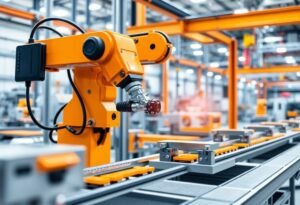The advent of self-driving cars represents a significant milestone in the realm of innovation and technology. As these vehicles become increasingly mainstream, it’s important to assess how they will affect the environment. This article explores the multifaceted impact of autonomous vehicles on our ecosystem, including reductions in carbon emissions, resource consumption, and urban infrastructure.
Reduction of Carbon Emissions
One of the most significant environmental benefits of self-driving cars is their potential to reduce carbon emissions. By optimizing driving patterns and routes, autonomous vehicles can minimize fuel consumption. This is particularly important as transportation is one of the largest contributors to greenhouse gas emissions globally. Studies suggest that if autonomous vehicles are widely adopted, we could see a decrease in emissions by up to 50% in urban areas, thereby mitigating climate change effects significantly.
Decreased Traffic Congestion
Autonomous vehicles are designed to communicate with each other and traffic systems, leading to smarter traffic flow. This intelligent adjustment can significantly decrease traffic congestion, which in turn reduces the time spent idling in traffic. With less idling, vehicles burn less fuel, leading to an overall decrease in harmful emissions. The reduction of congestion also improves air quality in dense urban environments, providing a healthier atmosphere for residents.
Efficient Use of Resources
Self-driving cars are engineered to be more efficient in their operations, which leads to a more sustainable use of resources. These vehicles typically require less fuel than traditional cars and are often designed to be electric or hybrid. The shift towards renewable energy sources for powering self-driving cars can diminish the reliance on fossil fuels, contributing to a lower carbon footprint across the transportation sector.
Impact on Urban Planning
The integration of autonomous vehicles into our daily lives will have profound effects on urban planning and infrastructure. As these vehicles reduce the need for parking spaces, cities can repurpose land for green spaces or affordable housing. This transformation can result in lower urban sprawl and a more pedestrian-friendly environment, ultimately decreasing the ecological footprint of urban living.
Influence on Public Transportation Systems
With the rise of self-driving technology, public transportation systems are also likely to evolve. Autonomous shuttles and buses can provide more efficient service with reduced operational costs. This improved public transit experience can encourage more people to use mass transportation, which can further diminish individual car use and reduce overall environmental impact. By integrating self-driving vehicles into public transit, cities can enhance accessibility and sustainability.
Development of Eco-Friendly Technologies
The innovation surrounding self-driving cars also promotes the development of eco-friendly technologies. From energy-efficient batteries to advanced materials that minimize environmental impact, the autonomous vehicle industry is driving research and innovation. Companies are investing in sustainable manufacturing processes, contributing to a green economy as they transition away from traditional automotive production methods. These advancements can significantly influence the overall environmental health of our planet.
In conclusion, while the path to widespread adoption of self-driving cars is still unfolding, their potential to create a positive impact on the environment is substantial. From reducing carbon emissions to reshaping urban environments, the implementation of autonomous vehicles could herald a new era of eco-friendliness and sustainability.
Disclaimer: This article is intended for informational purposes only and should not be considered as professional or expert advice.





















